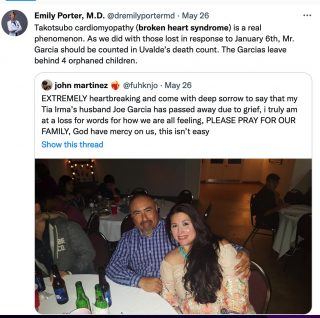This past week, Broken Heart Syndrome trended on Twitter after Joe Garcia, the husband of recently slain teacher Irma Garcia, in Uvalde Texas, reportedly died of a ‘broken heart’. The couple were childhood sweethearts. Doctors say death from grief is rare, but real. Here’s what you need to know about stress-induced cardiomyopathy, also known as takotsubo cardiomyopathy.
Heartbreaking news

We’ve all felt utter despair and heartbreak at some point in our lives. It may have been that time when a relationship ended or a loved one unexpectedly passed on. Or a period of deep sadness following a traumatic life event, a separation, betrayal, or rejection. It hurt, deep inside, as if the heart broke into a million pieces.
The Texas shootings has broken hearts
Losing the love of his life
“I truly believe Joe died of a broken heart,” Irma Garcia’s cousin Debra Austin wrote on a GoFundMe page. “Losing the love of his life of more than 25 years was too much to bear.”

Childhood sweethearts Irma and Joe Garcia – Photo courtesy of Go Fund Me
The Independent reported that another famous example of Broken Heart Syndrome was Hollywood icon Debbie Reynolds, who died in 2016 at the age of 84.
“She suffered a fatal stroke just one day after her daughter, Carrie Fisher, died from a heart attack. Before she passed, Reynolds told her son Todd Fisher that she wanted “to be with Carrie”. It was widely reported in 2003 that heartbreak also played a part in the death of music legend Johnny Cash.” – The Independent
How do you know when you have a broken heart versus having a heart attack?
If you suffer from a major stressful emotional event in your life, it could trigger Broken Heart Syndrome. It is often misdiagnosed as a heart attack because the symptoms and test results are similar. In fact, tests show dramatic changes in rhythm and blood substances that are typical of a heart attack, but unlike a heart attack, there’s no evidence of blocked heart arteries in Broken Heart Syndrome.
Broken heart syndrome is a temporary heart condition that’s often brought on by stressful situations and extreme emotions. The condition can also be triggered by a serious physical illness or surgery.
What is Broken Heart Syndrome?

S_L/Shutterstoc
According to the Mayo Clinic, people with Broken Heart Syndrome may have sudden chest pain or think they’re having a heart attack.
The condition affects just part of the heart, temporarily disrupting the heart’s usual pumping function.
The rest of the heart continues to work properly, or may even squeeze (contract) more forcefully.
Symptoms
The symptoms of Broken Heart Syndrome are treatable. It usually reverses in days or weeks.
Our heart is a critical and incredible organ: it is essentially a very efficient pump that circulates blood. In fact, it is the only organ in our body that can move itself, beating three billion times in the average person’s lifetime.
Broken heart syndrome can also occur in the young
Having said this, it doesn’t only occur in older bereaved people. Broken Heart Syndrome can strike even if you’re young and healthy. If you are female, you are at even greater risk. Research shows that women are a whopping 10 times more likely to suffer from stress-induced cardiomyopathy than men.
Research shows it’s on the rise in women
While this may sound pretty alarming – your heart may even be palpitating at the mere thought of this right now – the upside is that the more we understand the syndrome, the better we can protect our health.
Sad or depressed
Researchers have also discovered that when we are sad or depressed, our immune system is compromised, and we experience an increase in our blood pressure and heart rate. This is what causes significant muscle weakness. It can also cause hormones to race wildly through the body, specifically cortisol.
Beware cortisol

Cortisol can be a rather destructive hormone when you have too much of it; a steroid hormone, it regulates a wide range of vital processes throughout the body. When you feel that heavy, sinking feeling in your heart, what you are feeling is what is called “the cortisol effect”, which directly impacts our metabolism. If you have too much cortisol over a prolonged period, it can lead to several health problems.
Faint-hearted?
Not all of us have emotional armor built of steel. If you are more the faint-hearted kind with a tendency to depression or suffer more from deep emotions and heart trauma, then you may be more at risk.
Most patients are able to recover within weeks from Broken Heart Syndrome, and some people don’t even know they suffer from it; the condition can be life-threatening if patients have congestive heart failure, low blood pressure, shock, or heart rhythm abnormalities.
Studies have also confirmed that if a person has a tendency to be depressed over time and has recently suffered a love trauma, they would be five times more likely to die than a person with depression alone or a heart condition alone.
Testing for Broken Heart Syndrome
The condition can be diagnosed if medical tests rule out a heart attack and non-heart-related problems.
Tests can include an electrocardiogram (ECG), a blood test, an echocardiogram, a cardiac magnetic resonance imaging (MRI) scan, or an angiogram.
How to protect your heart
If you have suffered a major setback in matters of the heart, then you need to be conscious of your vulnerability.
In highly stressful situations, knowing how to regulate your breathing and using yoga techniques will be very helpful intense emotional situations. No matter how healthy you are, you should always try to strengthen yourself at times of deep emotional strain.
- Choose healthy foods to keep you nourished and lift your mood during sad times. Foods high in magnesium like avocado, nuts, whole grains, and beans are good for you. Avoid sugary and refined carbohydrates as they will play havoc with your cortisol, which, as we know, is part of the problem.
- It’s also really important to sleep during this time and to keep a routine. Sleep deprivation will also ignite cortisol, and so the spiral will continue. If you are not able to deal with your sleep problems naturally, then you should seek professional help. Do not let sleep issues drag on.
- Don’t mope around; get up and move. Getting into nature is a really smart way to feel better. Sun (nature’s very own free vitamin D shot) has the gift of making anyone feel a little better; nature also has a calming effect on our minds.
- Exercise is considered a general medicine when it comes to beating depression or when you are feeling low. The reason being is that you release natural endorphins into your body when you exercise, which will improve your mood – and your health
- Pets are great companions during stressful times, and studies have shown that owning a pet can provide real relief from depression.
- Maintain social relationships with friends and family. Older people who are lonely tend to have higher levels of stress, and are less able to adapt to difficult situations if they don’t have anyone to lean on.
Loneliness can increase levels of stress hormones in the body like cortisol, which in turn, affects sleep quality and increases blood pressure. Don’t isolate yourself. Isolation and solitude can also weaken your immune system. No matter how much you want to hide away.
Manage your stress
Perhaps the most important lesson we can all learn is how to better manage our stress day-to-day.
Stress almost always manifests itself through physical symptoms: migraines, grinding teeth, lightheadedness, nausea, exhaustion, heart palpitations, insomnia, and a decreased or increased appetite. Constantly worrying and carrying the burden of stress has also been linked to premature ageing.
We should not forget the value of spirituality. Whatever your religious persuasion is, prayer or even meditation can comfort a broken heart. In addition, take control of your life and what you read, watch and listen to.
Stay away from negative news and views, and even negative people. If you spend a lot of time on your own, then prepare yourself for those times when you feel most lonely, especially during holiday periods.
Get help!
Importantly, please do not hold onto your emotional pain. Studies show that expressing emotions greatly reduces the body’s stress response. Keep a journal, join a support group, and lean on good friends and family for support.
When you are in a highly anxious state you can lose perspective. Don’t feel embarrassed to ask for help and if you are not improving, seek professional aid and check in with your doctor.
By taking positive and proactive health steps, you will ensure you’re looking after your mind, body, and, above all, your precious heart.



![women [longevity live]](https://longevitylive.com/wp-content/uploads/2020/01/photo-of-women-walking-down-the-street-1116984-100x100.jpg)










